Strictly Personal
IWD 2023: Women, inclusion and innovation by Adaoha Ugo-Ngadi
Published
1 year agoon
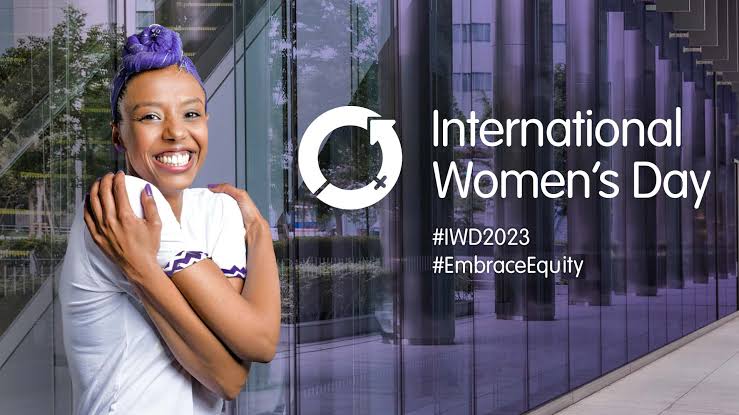
On March 8 of every year, the world celebrates women everywhere regardless of racial, ethnic, economic or educational differences. The attributes and strides of women are trumpeted, and their continued struggles highlighted for intervention. I‘ve always found it gratifying that the world stops to reflect on the wonders of its greatest asset— women!
This time-honoured tradition of designating a day to celebrate women, which became officially universal in 1977, is a heritage born from the struggles of women across continents to actualize fundamental rights to vote, work, organize and pursue their cherished aspirations. These struggles were shaped by revolution and protest, exacting costly sacrifices.
We have come a long way indeed, but must always remember those who paved the way, and draw from their inspiration so as to appreciate the weight of the sacred baton handed down to us. We must continue to carry this baton until women everywhere shatter all barriers to their full liberation and rightful participation in society.
It is with a full consciousness of the meaning behind the International Women’s Day that I approach March 8 every year. As a woman who has faced and overcome great challenges in my journey to social and professional actualisation— as is the story of too many women— this day speaks to our defiance and triumphs despite stiff resistance and gruelling odds.
It always breaks my heart whenever discriminatory experiences of women in the world of work are shared. And I can relate, having experienced my own fair share. When women’s professional competence is dismissed because they’re women, it strikes at the soul. When hard working women rise to the top but have their success questioned because they’re women, it is a travesty. When innovative women present their brilliant proposals for consideration but receive condescending and patronizing gestures instead, it is shameful. As long as the ideas, hard work and success of women anywhere continue to be questioned, even dismissed, because they are women, the struggle for equity is still far off. Women must be accorded their due respect, professionally and otherwise. Their ideas, skills and results must be evaluated in their own rights. This is the only way to go!
Reflecting on the theme for this year’s celebration— DigitALL: Innovation and technology for gender equality— I grapple with feelings of ambivalence. On the one hand, I am excited that in the world of innovation and technology, women all over the world are helping to reimagine the world and create a future defined by new and more advanced thinking, systems and products.
To move from the battlegrounds of sweatshops and breadlines to the disruptive space of technology and innovation is quite the progress. Women have indeed come a long way.
However, I am troubled by how unevenly distributed this progress has been. In many developing countries, the scourge of millions of out-of-school young girls is still rife. Access to basic education has been very limited. For many of these girls, the battle is one of literacy and basic education— that centuries-old problem now distant history in many an advanced economy— not digital inclusion. We have a long way still to go!
Even in places where women have some access to innovation and technology, the numbers are concerning. Women make up only under a third of the workforce in STEM and only 22% of AI workers globally; the gender digital divide in access to the internet in the world’s least developed countries is at a staggering 32.9%; women’s exclusion from the digital world has shaved USD 1 trillion from the GDP of low- and middle-income countries in the last decade—a loss estimated to increase to USD 1.5 trillion by 2025 without necessary action.
Bridging the digital divide and expanding access to technology and innovation for women requires strategic thinking and sustained targeted action. For Africa, opportunities around free trade, cross-border economic engagement, and multi-country collaboration and resource-pooling represent just the right vehicle to drive this inclusion.
The socio-economic exclusion of women in Africa, can best be addressed through strategic collaboration. And the reason is not far-fetched. With limited resources and an exploding population, many African countries are struggling to meet the demands of inclusion and development. The restriction-free international trade vehicle offers a unique opportunity for more women to access opportunities across borders, widening access and multiplying alternatives.
The cross-border trade intervention, in its different forms— bilateral, multilateral, continental— has continued to expand opportunities for women in health, education, agriculture, services and industry. It must now be harnessed to accelerate inclusion of women in technology and innovation. With the African Continental Trade Area agreement (AfCFTA), a powerful vehicle for accessing the single largest African market ever has been built.
Innovators and entrepreneurs from one end of Africa can leverage on opportunities from another end of Africa to create platforms for innovation and technology capacity development for women and girls. We are already seeing these play out through the rapid travel of digital and educational platforms between African countries, a development laying the groundwork for empowerment of women in innovation and technology. These must be sustained and expanded.
Given the massive costs to development, income and opportunity, it is time to push hard for the inclusion of more women in innovation and technology. This struggle can afford no bystanders. Everyone is a stakeholder. Government, private sector, third sector, NGOs and individuals must play their part. We must embrace equity in innovation and technology, and as we do, remember that the battle for women’s inclusion in many other areas is still not won.
You may like
-


This Sudan war is too senseless; time we ended it, By Tee Ngugi
-


Air Peace, capitalism and national interest, By Dakuku Peterside
-


This is chaos, not governance, and we must stop it, By Tee Ngugi
-


Off we go again with public shows, humbug and clowning, By Jenerali Uliwengu
-


How patriarchy underpins gender violence today, By Tee Ngugi
-


Help! There’s a dangerous, secret plot to save the EAC from imminent death, By Charles Onyango-Obbo
Strictly Personal
This Sudan war is too senseless; time we ended it, By Tee Ngugi
Published
1 day agoon
April 28, 2024
Why are the Sudanese Armed Forces (SAF) and the paramilitary Rapid Support Forces (RPF) engaged in a vicious struggle? It is not that they have ideological, religious or cultural differences.
Not that people should fight because of these kinds of differences, but we live in a world where social constructions often lead to war and genocide. It is not that either side is fighting to protect democracy. Both sides were instruments of the rapacious dictatorship of Omar el-Bashir, who was overthrown in 2019.
Both are linked to the massacres in Darfur during Bashir’s rule that led to his indictment by the International Criminal Court for crimes against humanity. They both stood by as ordinary, unarmed people took to the streets and forced the removal of the Bashir regime.
None of these entities now fighting to the last Sudanese citizen has any moral authority or constitutional legitimacy to claim power. They both should have been disbanded or fundamentally reformed after the ouster of Bashir.
The SAF and the RSF are fighting to take over power and resources and continue the repression and plunder of the regime they had supported for so long. And, as you can see from news broadcasts, they are both well-versed in violence and plunder.
Since the fighting began in 2023, both sides have been accused of massacres that have left more than 30,000 people dead. Their fighting has displaced close to 10 million people. Their scramble for power has created Sudan’s worst hunger crisis in decades. Millions of refugees have fled into Chad, Ethiopia and South Sudan.
The three countries are dubious places of refuge. Chad is a poor country because of misrule. It also experiences jihadist violence. Ethiopia is still simmering with tensions after a deadly inter-ethnic war.
And South Sudan has never recovered from a deadly ethnic competition for power and resources. African refugees fleeing to countries from which refugees recently fled or continue to flee sums up Africa’s unending crisis of governance.
Africa will continue to suffer these kinds of power struggles, state failure and breakdown of constitutional order until we take strengthening and depersonalising our institutions as a life and death issue. These institutions anchor constitutional order and democratic process.
Strong independent institutions would ensure the continuity of the constitutional order after the president leaves office. As it is, presidents systematically weaken institutions by putting sycophants and incompetent morons in charge. Thus when he leaves office by way of death, ouster or retirement, there is institutional collapse leading to chaos, power struggles and violence. The African Union pretends crises such as the one in Sudan are unfortunate abnormally. However, they are systemic and predictable. Corrupt dictatorships end in chaos and violence.
Tee Ngugi is a Nairobi-based political commentator.
Strictly Personal
Air Peace, capitalism and national interest, By Dakuku Peterside
Published
2 weeks agoon
April 16, 2024
Nigerian corporate influence and that of the West continue to collide. The rationale is straightforward: whereas corporate activity in Europe and America is part of their larger local and foreign policy engagement, privately owned enterprises in Nigeria or commercial interests are not part of Nigeria’s foreign policy ecosystem, neither is there a strong culture of government support for privately owned enterprises’ expansion locally and internationally.
The relationship between Nigerian businesses and foreign policy is important to the national interest. When backing domestic Nigerian companies to compete on a worldwide scale, the government should see it as a lever to drive foreign policy, and national strategic interest, promote trade, enhance national security considerations, and minimize distortion in the domestic market as the foreign airlines were doing, boost GDP, create employment opportunities, and optimize corporate returns for the firms.
Admitted nations do not always interfere directly in their companies’ business and commercial dealings, and there are always exceptions. I can cite two areas of exception: military sales by companies because of their strategic implications and are, therefore, part of foreign and diplomatic policy and processes. The second is where the products or routes of a company have implications for foreign policy. Air Peace falls into the second category in the Lagos – London route.
Two events demonstrate an emerging trend that, if not checked, will disincentivize Nigerian firms from competing in the global marketplace. There are other notable examples, but I am using these two examples because they are very recent and ongoing, and they are typological representations of the need for Nigerian government backing and support for local companies that are playing in a very competitive international market dominated by big foreign companies whose governments are using all forms of foreign policies and diplomacy to support and sustain.
The first is Air Peace. It is the only Nigerian-owned aviation company playing globally and checkmating the dominance of foreign airlines. The most recent advance is the commencement of flights on the Lagos – London route. In Nigeria, foreign airlines are well-established and accustomed to a lack of rivalry, yet a free-market economy depends on the existence of competition. Nigeria has significantly larger airline profits per passenger than other comparable African nations. Insufficient competition has resulted in high ticket costs and poor service quality. It is precisely this jinx that Air Peace is attempting to break.
On March 30, 2024, Air Peace reciprocated the lopsided Bilateral Air Service Agreement, BASA, between Nigeria and the United Kingdom when the local airline began direct flight operations from Lagos to Gatwick Airport in London. This elicited several reactions from foreign airlines backed by their various sovereigns because of their strategic interest. A critical response is the commencement of a price war. Before the Air Peace entry, the price of international flight tickets on the Lagos-London route had soared to as much as N3.5 million for the economy ticket. However, after Air Peace introduced a return economy class ticket priced at N1.2 million, foreign carriers like British Airways, Virgin Atlantic, and Qatar Airways reduced their fares significantly to remain competitive.
In a price war, there is little the government can do. In an open-market competitive situation such as this, our government must not act in a manner that suggests it is antagonistic to foreign players and competitors. There must be an appearance of a level playing field. However, government owes Air Peace protection against foreign competitors backed by their home governments. This is in the overall interest of the Nigerian consumer of goods and services. Competition history in the airspace works where the Consumer Protection Authority in the host country is active. This is almost absent in Nigeria and it is a reason why foreign airlines have been arbitrary in pricing their tickets. Nigerian consumers are often at the mercy of these foreign firms who lack any vista of patriotism and are more inclined to protect the national interest of their governments and countries.
It would not be too much to expect Nigerian companies playing globally to benefit from the protection of the Nigerian government to limit influence peddling by foreign-owned companies. The success of Air Peace should enable a more competitive and sustainable market, allowing domestic players to grow their network and propel Nigeria to the forefront of international aviation.
The second is Proforce, a Nigerian-owned military hardware manufacturing firm active in Rwanda, Chad, Mali, Ghana, Niger, Burkina Faso, and South Sudan. Despite the growing capacity of Proforce in military hardware manufacturing, Nigeria entered two lopsided arrangements with two UAE firms to supply military equipment worth billions of dollars , respectively. Both deals are backed by the UAE government but executed by UAE firms.
These deals on a more extensive web are not unconnected with UAE’s national strategic interest. In pursuit of its strategic national interest, India is pushing Indian firms to supply military equipment to Nigeria. The Nigerian defence equipment market has seen weaker indigenous competitors driven out due to the combination of local manufacturers’ lack of competitive capacity and government patronage of Asian, European, and US firms in the defence equipment manufacturing sector. This is a misnomer and needs to be corrected.
Not only should our government be the primary customer of this firm if its products meet international standards, but it should also support and protect it from the harsh competitive realities of a challenging but strategic market directly linked to our national military procurement ecosystem. The ability to produce military hardware locally is significant to our defence strategy.
This firm and similar companies playing in this strategic defence area must be considered strategic and have a considerable place in Nigeria’s foreign policy calculations. Protecting Nigeria’s interests is the primary reason for our engagement in global diplomacy. The government must deliberately balance national interest with capacity and competence in military hardware purchases. It will not be too much to ask these foreign firms to partner with local companies so we can embed the technology transfer advantages.
Our government must create an environment that enables our local companies to compete globally and ply their trades in various countries. It should be part of the government’s overall economic, strategic growth agenda to identify areas or sectors in which Nigerian companies have a competitive advantage, especially in the sub-region and across Africa and support the companies in these sectors to advance and grow to dominate in the African region with a view to competing globally. Government support in the form of incentives such as competitive grants ,tax credit for consumers ,low-interest capital, patronage, G2G business, operational support, and diplomatic lobbying, amongst others, will alter the competitive landscape. Governments and key government agencies in the west retain the services of lobbying firms in pursuit of its strategic interest.
Nigerian firms’ competitiveness on a global scale can only be enhanced by the support of the Nigerian government. Foreign policy interests should be a key driver of Nigerian trade agreements. How does the Nigerian government support private companies to grow and compete globally? Is it intentionally mapping out growth areas and creating opportunities for Nigerian firms to maximize their potential? Is the government at the domestic level removing bottlenecks and impediments to private company growth, allowing a level playing field for these companies to compete with international companies?
Why is the government patronising foreign firms against local firms if their products are of similar value? Why are Nigerian consumers left to the hands of international companies in some sectors without the government actively supporting the growth of local firms to compete in those sectors? These questions merit honest answers. Nigerian national interest must be the driving factor for our foreign policies, which must cover the private sector, just as is the case with most developed countries. The new global capitalism is not a product of accident or chance; the government has choreographed and shaped it by using foreign policies to support and protect local firms competing globally. Nigeria must learn to do the same to build a strong economy with more jobs.
EDITOR’S PICK
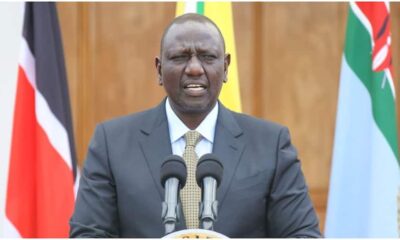

African leaders want record World Bank financing to address climate change
Ahead of a World Bank conference scheduled for later this year, African leaders on Monday called for rich countries to...
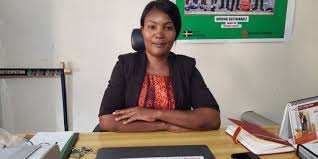

Conservationist, Kearns, names intolerance and digital media abuse as threats to media freedom
Nsama Kearns, the Executive Director of Care for Nature, speaks on the indispensable role of a free media in society....
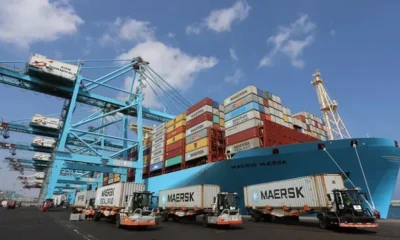

Nigeria gets $600 million investment from Danish firm Moller-Maersk
Nigeria’s presidency said on Sunday that President Bola Tinubu had secured an investment of $600 million from Danish shipping and...
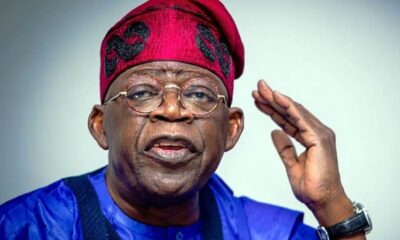

I saved Nigeria from bankruptcy by removing fuel subsidy— Tinubu
Nigerian President, Bola Tinubu, on Sunday, boasted that he saved Nigeria from going bankrupt by removing fuel subsidy on his...


Behind the News: All the backstories to our major news this week
Over the past week, there were lots of important stories from around the African continent, and we served you some...
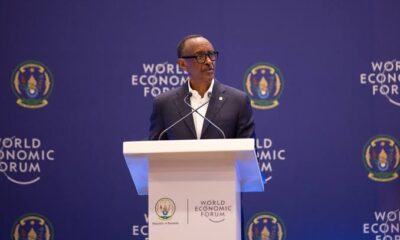

Video: How Rwanda is driving Ai revolution in Africa
In this video, the Managing Director of Rwanda’s Centre for the Fourth Industrial Revolution, Crystal Rugege, speaks on the country’s...


This Sudan war is too senseless; time we ended it, By Tee Ngugi
Why are the Sudanese Armed Forces (SAF) and the paramilitary Rapid Support Forces (RPF) engaged in a vicious struggle? It...
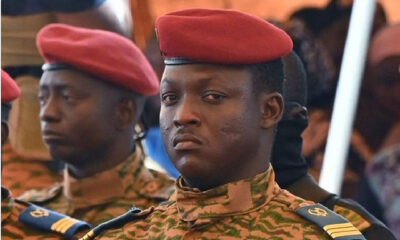

Burkina Faso investigating reports of northern killings
A government spokesman has revealed that Burkina Faso is looking into reports that 223 people were killed by the Burkinabe...


Nigeria: Bureaux De Change operators to harmonise retail FX market
Amidst the volatility around the Nigerian currency and its foreign exchange market, the Association of Bureaux De Change Operators in...


France willing to pay for Morocco’s 3GW power line to Western Sahara
Bruno Le Maire, the French finance minister, said on Friday that France was ready to help pay for a 3...
Trending
-

 Behind the News1 day ago
Behind the News1 day agoBehind the News: All the backstories to our major news this week
-

 Politics1 day ago
Politics1 day agoBurkina Faso investigating reports of northern killings
-
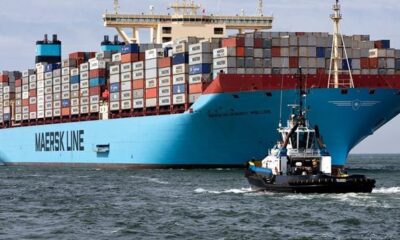
 Musings From Abroad2 days ago
Musings From Abroad2 days agoNigeria loses $9.2 billion to foreign shipowners
-

 VenturesNow1 day ago
VenturesNow1 day agoNigeria: Bureaux De Change operators to harmonise retail FX market


